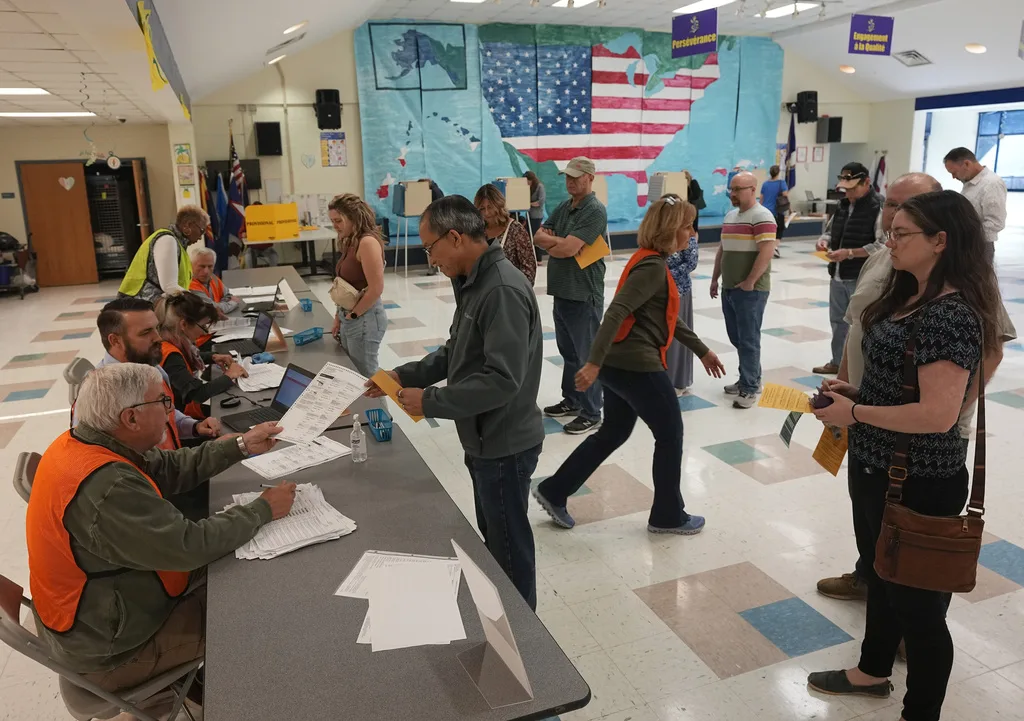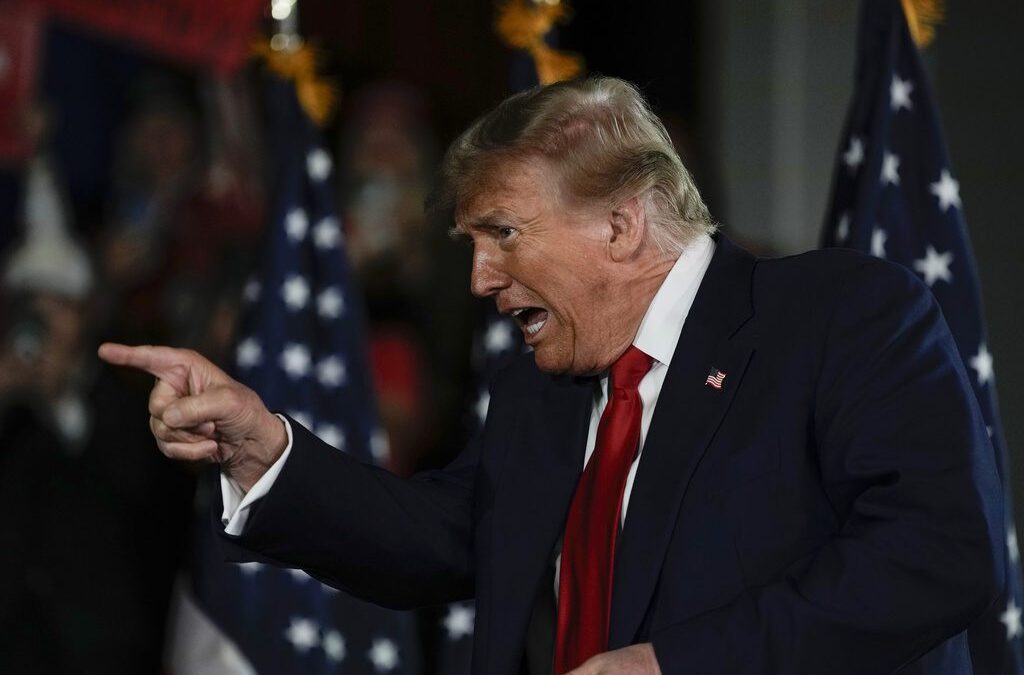
(AP photo/Steve Helber)
After working hard to turn out their own voters to cast ballots during the early voting period in the 2023 elections, Virginia Republicans have returned to their perennial efforts to restrict early and other convenient voting methods. This week, a Democratic-led committee rejected the GOP’s latest attempts to roll back recent years’ voting improvements.
Republican Sen. Mark Peake led this week’s efforts to restrict voting in the commonwealth.
Peake’s Senate Bill 42 would have cut Virginia’s early voting period from 45 days to just three weeks, and Senate Bill 92 would have ended same-day registration for voters on the day of an election but otherwise still allowed the practice.
In the 2023 elections, the current law accommodated a surge of Election Day registrations around college campuses in elections anchored in Williamsburg and Blacksburg.
Peake claimed his bills were the result of his concern for the workloads of local registrars and election workers across the state, since Virginia holds elections every year.
“You know who bears the brunt of all of that? Our hardworking registrars and staff,” he said in the hearing. “This is for them.”
New Virginia Majority co-founder and co-executive director Tram Nguyen testified against the measures, pointing out that early voting largely happens during normal operating hours for registrars. She was among representatives from several advocacy groups to speak against the bills.
The committee also effectively killed Peake’s Senate Bill 32, which would require verification of Social Security numbers when registering new voters. Senate Bill 45, another bill from Peake which would have restored Virginia’s photo identification requirement when voting, was incorporated into Senate Bill 81, a nearly identical bill introduced by Republican Sen. John McGuire, which also failed along party lines.
While photo ID is currently accepted as voter identification in Virginia, voters can also present alternative documentation, like utility bills or bank statements, that contain the address of the voter.
No one testified in support of Republicans’ anti-voting bills, although one member of the committee noted that the legislature’s online participation system had been experiencing problems.
After these measures failed on party-line votes, the Senate Democratic Caucus released a celebratory statement: “Today in the Senate Privileges in Elections Committee, Democrats stood together to maintain the freedoms and ease of voting in Virginia and keep the Virginia Voting Rights Act in place.”
Democratic Sen. Aaron Rouse, who chairs the committee in which the bills were considered, accused Republicans of attacking voting rights.
“Senate Republicans are continuing their backwards assault on Virginians’ voting rights, but not on my watch,” he said in a statement to Virginia Scope. “We will protect voting access and standing up for Virginia voters because nothing is more sacred in a democracy than our right to vote.”
While all of the Senate anti-voting legislation filed to date has been killed in committee by the Democratic majority, several House bills that mirror Peake’s proposals have yet to receive hearings in the lower chamber.
This push to restrict voting is expected to continue to meet resistance from Democratic delegates, who will likely use their majority to kill these bills in committee.
Democrats made dramatic improvements to Virginia’s voting laws when they controlled the legislature and the governorship during the 2020 and 2021 legislative sessions, and Republicans have spent the past two years working tirelessly to undo those voting reforms.
House Bill 1, introduced in the 2020 legislative session, passed both Democratic-controlled chambers and was signed into law by Democratic governor Ralph Northam. It removed the need to have a prescribed justification to vote early, and it allowed Virginians to vote early in person up to 45 days prior to an election.
The steep uptick in early voting numbers in that November’s election suggests that Virginians had been waiting for this change. When early voting became readily available in 2020, the number of Virginians who voted ahead of Election Day jumped more than 18-fold – from about 144,000 voters to almost 2.7 million. That number has dropped in the years since, but a bit over 30% of the electorate has voted early for the past two elections. In 2022, more than twice as many voters cast ballots early than in the previous midterm elections in 2018.
The Republican Party began attacking the legitimacy of voting by mail all across the country in 2020, spreading false claims of fraud, but both mail-in voting and early in-person voting have been popular with Republicans and Democrats alike in the commonwealth.
Republican Gov. Glenn Youngkin even made a specific push on behalf of his party to convince more GOP voters to cast their ballots before Election Day in 2023. Last July, he launched a new initiative to encourage more Republicans to take advantage of the laws Democrats passed to make voting early easier. However, that effort failed to result in the wins for his party that he’d hoped for.
Republicans in the General Assembly have repeatedly attempted to roll back or repeal Virginia’s extended early voting period in previous legislative sessions – efforts that were blocked by the Democratic majority in the state Senate.
Just last year, GOP lawmakers pushed bills that would shorten the early voting period from 45 days to just two weeks; reinstate the list of prescribed reasons required to vote early; and eliminate the permanent absentee voter list, which allows voters to sign up to receive mail-in ballots in every election instead of having to request one each time.
“Democrats have been making it easier for Virginians to vote and vote early for years now,” said House Democratic Caucus communications director Morgan Hopkins. “When Democrats had the majority, the Commonwealth went from the 49th hardest state to vote into the 11th easiest, while the Republicans have worked to make it harder for Virginians to vote at every turn.”
Politics

VIDEO: Youngkin won’t add legal protection for birth control access
Access to birth control remains vulnerable to potential future attacks after Republican Gov. Glenn Youngkin effectively blocked a bill that would...

Trump says he would allow red states to track pregnancies, prosecute abortion ban violators
In an interview published by Time magazine this week, former president Donald Trump detailed his plans for a potential second term and said he would...
Local News

The zodiac signs of 12 iconic women offer insight into their historic accomplishments
Zodiac signs can tell you a lot about someone’s personality. Whether they’re an earth, water, air, or fire sign, these 12 categories (which are...

Virginia verses: Celebrating 5 poetic icons for National Poetry Month
There’s no shortage of great writers when it comes to our commonwealth. From the haunting verses of Edgar Allan Poe, who found solace in Richmond's...




